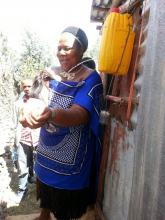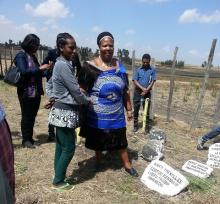Swaziland Ministry of Health learns best practices from Ethiopia
Mbabane, 16 February 2016 - While endeavouring to achieve Universal Health Coverage, which is the goal of the newly formulated National Health Strategic Plan 2014-2018, the Ministry of Health has visited Ethiopia to learn about their best health practices.
According to evidence from World Health Organization (WHO), Ethiopia is one of the countries in the African Region, that have made strides in improving health outcomes by bringing health services close to people through the use of community based health workers. It is against this background that the WHO Swaziland country office supported the Minister of Health Sibongile Ndlela-Simelane’s three-day benchmarking mission to that country last week. The minister was accompanied by Principal Secretary in her ministry Dr Simon Zwane and WHO Health Systems Advisor Khosie Mthethwa. The purpose of the visit was to learn from the Ministry of Health Ethiopia how their health services are organised and financed to ensure Universal Health Coverage.
Upon arrival, the Swaziland delegation was met by Advisor in the Office of the Minister of Health Ethiopia Dr. Tedla W. Giorgis and later introduced to the State Minister Dr. Kebede Worku. The team was taken through presentations and a field visit to Gimbichu Woreda, located in Oromia Regional State which has a population of over one million people, with a total of 23 187 households.
During an interview, the PS stated that as the goal of the strategic plan was to achieve Universal Health Coverage, it is important that focus is put on the three principles; access, equity and quality of services. Dr Zwane said what this means was that government has to ensure that health services are accessible at the grassroots level. He noted that the local system seemed to be more focused on the curative, which is accessible in health facilities only. He said this model seems to be costly, and added that primary health care, which focuses on prevention, should be strengthened.
The PS said during their visit to Ethiopia, they learnt how health services were brought close to the people through what they termed health posts. This programme is called Health Extension Programme as it uses Health Extension Officers to provide services. These officers are trained but are not necessarily nurses.
“This programme is a policy directive by the government of Ethiopia. It is community oriented and service providers are formally trained,” said the PS.
The PS noted that Health Extension Officers do not wait for people to come for services. They look at the health needs of the people in the community, provide education and also help them implement the teachings. The emphasis of this approach is on health promotion. Dr Zwane said they also learnt about a community health insurance where community members become members and can access the fund. Members contribute a small amount towards this fund and are met halfway by the government.
WHO Health Systems Advisor Khosi Mthethwa said the lessons learnt from Ethiopia would come handy now that the country is in the process of formulating its own National Health Policy. She noted that the country has a high maternal and child mortality rates, saying adopting this model would address this problem as it has proven to have worked in Ethiopia.
“The Primary healthcare level is managed by Health Extension Workers. Within the secondary level they have Integrated Emergency Surgery Officers, who had a three years training following a degree in nursing and other health field. This cadre has contributed a lot in reducing maternal mortality because they are found in health facilities close to the communities and are able conduct emergency surgery,” Mthethwa said.
______________________________________________
For more information, please contact:
MAKADZANGE Kevin, Email: %20makadzangek [at] who.int (makadzangek[at]who[dot]int)
______________________________________________
Below:
01- The Honourable Minister with WHO Health Systems Advisor Khosie Mthethwa on arrival at Gimbichu Woreda area.
02- Minister of Health Honorable Sibongile Ndlela-Simelane washing her hands from a traditional handwashing facility during her visit to Gimbichu Woreda in Ethiopia
03- One of the Extension Health Workers in Gimbichu Woreda showing the Minister how information is disseminated to the local people through writing it on stones.
04- The Honourable Minister posing with Principal Secretary in her Ministry Dr Simon Zwane during their visit to Gimbichu Woreda, Ethiopia recently.







